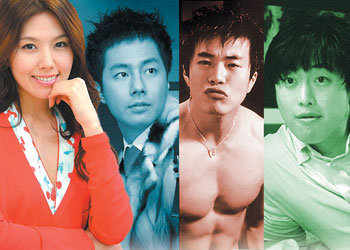Is Good Omen a Hindrance For Gaining Popularity?
Is Good Omen a Hindrance For Gaining Popularity?
Posted April. 15, 2004 22:24,

In both television and theater, nasty protagonists who have no respect for others are appearing on-screen continuously, attracting audience attention. In recent times this adjective, referring to rude people, is widely used as an expression referring to attractive actors and actresses.
This unique arising culture originated from the Fun Culture, which consists of digging up obsolete or bad words and associating them with a brand-new, positive image. The adjective, bizarre, which means abnormal or uncanny, has been transformed to mean special or funny, and in this manner the adjective nasty has also been rejuvenated.
The nasty people in movies and television are becoming associated with a, rich, sympathic, and attractive ideal. This new phenomenon is regarded as a brand-new cultural code for the youth.
--An Internet novel has changed the meanings of words
The changing of the meaning of the adjective, nasty originated from the emergence of at the beginning of the 21st century, reflecting the taste of young generations. Tutoring the Student of the Same Age by Choi Soo-wan, Pussy in Attic by Kim Yoo-ri, Something of One percent by Hyun Ko-woon, and My Nasty Darling by Lee Hat-nim are popular internet novels that have been remade into television drama series, and of which have nasty characters.
Their images are not negative. Recognizing dichotomy, rich = villain has been vanquished, and wealth has arisen as a target of envy among young generations. A new tendency viewing the nasty character as a person who is kind-hearted, though little bit rude to others, has gained prevalence.
This tendency lies in direct opposition to the character of Ma Dong-tak in Lee Hyun-ses novel, Scary Foreign Baseball Team, released in 1986 and reflecting the transformation of society. In this novel, the plot develops to reveal son of a rich man= nasty= cold-bloodeded= jealous man= evil person.
--Is the nasty person rich?
In the movie Tutoring the Student of the Same Age, released in 2003, rich high school student Jiwan is held back in class for one year. He always speaks rudely to his tutor, female college student Suwan, and even smokes during class. Jiwan says things like, You can just play for two hours and I will give you the money anyway.
In the movie, My Nasty Darling, which premiered in January, the protagonist, Hyungjoon is a college student who loves luxurious accessories. He commands female high school student Hayoung, who mistakenly scratched Hyungjoons Lexus, to Make up the damages! He makes her become his servant and continuously commands her to perform chores such as cleaning and dishwashing. When Hayoung appeals to him, saying, You look very rich, please have mercy, Hyungjoon retorts, I am so poor.
In the brand-new MBC drama, Fire Bird, protagonist Jieun causes a traffic accident, narrowly missed Sehoon. Rather than begging pardon from Sehoon, she is primarily concerned with her car. Jieun gets angry when Sehoon slaps her in the face, but her friends rebuke her by saying Did you get nasty with someone again?
--Are the nasty people warm-hearted?
The reason for the popularity of these nasty characters arise from a sympathetic viewership who feels that although these protagonists appear rude at first glance, but have naïve and innocent hearts underneath it all.
In the SBS drama An Accident Occurred in Bali, which ended in March, Jaemin, the son of a rich company owner, cries over his lover Sujeong rather than pretending to be machismo or veiling his inner heart. He even gives up his seat as successor for love, and ultimately commits suicide.
In the MBC drama, Pussy in Attic, which ended in July, 2003, Kyungmin, the grandson of a rich family, always offers his roommate Jeongeun a meal, but still manages to drive her crazy. When Jeongeun becomes really annoyed with his behavior, Jeongeun begs pardon with innocent eyes, attracting female viewers affections.
Nowadays people express themselves clearly and take their share openly. People are generous with selfish characters, remarked chief producer of the drama, Fire Bird, adding, Their spirit of regarding exemplary people as burdensome creates these characters.
sjda@donga.com kathycho@donga.com




![연금 개시 가능해지면 年 1만 원은 꼭 인출하세요[은퇴 레시피]](https://dimg.donga.com/c/138/175/90/1/wps/NEWS/IMAGE/2026/02/20/133390850.4.jpg)
![취권하는 중국 로봇, ‘쇼’인 줄 알았더니 ‘데이터 스펀지’였다?[딥다이브]](https://dimg.donga.com/c/138/175/90/1/wps/NEWS/IMAGE/2026/02/20/133391101.1.png)

